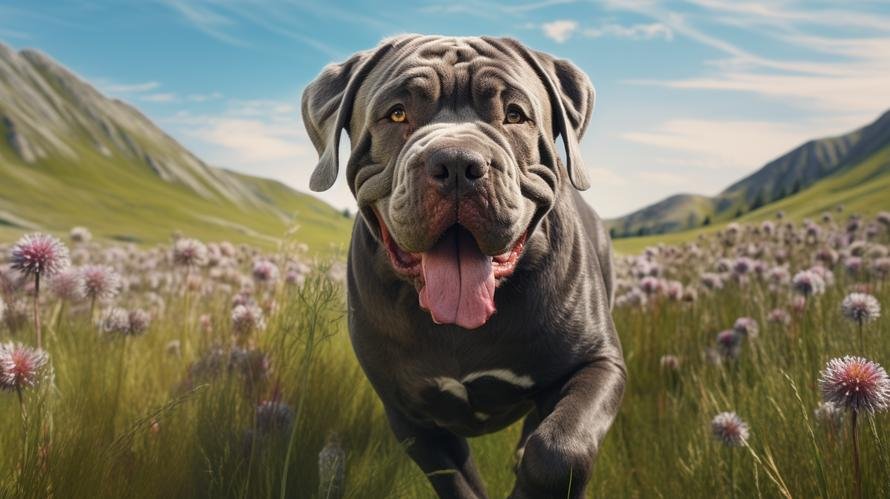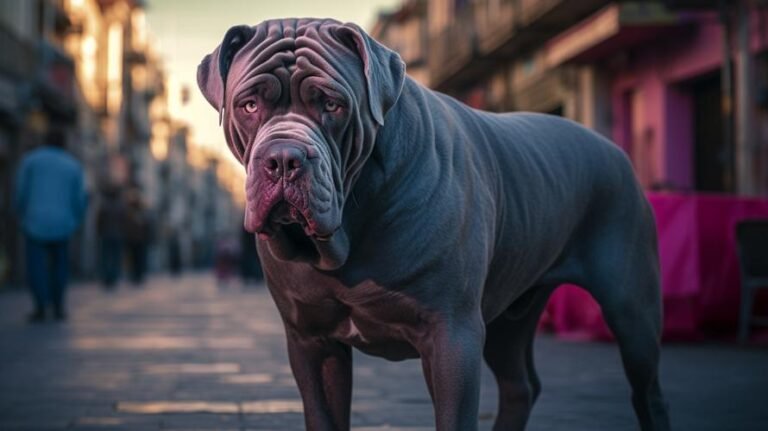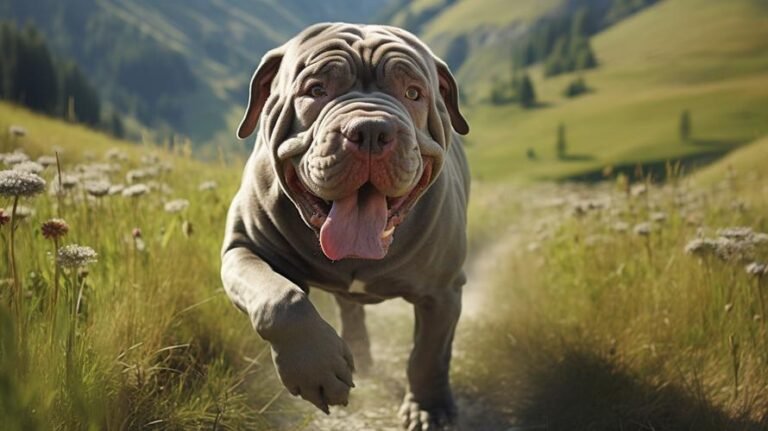Imagine a colossal, gentle giant with a heart as grand as its frame, patrolling the premises of an ancient Italian estate. This isn’t a mythical creature from a long-lost legend but the Neapolitan Mastiff—a breed with a lineage that dates back to the Roman Empire. Known for their wrinkled faces and imposing size, these dogs were once the gladiators of the canine world. Fast forward to today, and they’re the gentle companions sprawled out on living room floors across the globe. Yet, despite this transformation from warriors to family pets, one aspect has remained paramount—their diet.
Now, let me lead you onto a tasty trail of discovery about what fuels these four-legged companions. Should a Neapolitan Mastiff eat grain-free? Some may toss this question around like a hot potato, but today, we’ll dig into the meat (and potatoes) of this dietary dilemma.
First off, what is grain-free dog food? Essentially, it’s a type of dog food made without wheat, corn, rice, and other grains. Instead, it’s typically packed with alternative carbohydrate sources like potatoes, peas, and lentils. The grain-free trend took off with the idea that because dogs’ ancestors didn’t graze fields of wheat or corn, modern dogs might be better off without these ingredients as well.
But before we leap onto the grain-free bandwagon, let’s consider the Neapolitan Mastiff’s specific needs. This breed is not just any dog—they are a unique blend of strength, loyalty, and sensitivity. They have large, expansive chests and a massive build, meaning they require a diet that supports muscle growth and joint health while preventing obesity.
In the colossal world where Neapolitan Mastiffs roam, heart health is non-negotiable. The grain-free debate took an interesting turn when the FDA announced an investigation into a potential link between grain-free diets and a heart condition called canine dilated cardiomyopathy (DCM) in dogs. While the Neapolitan Mastiff isn’t specifically known to be at an increased risk for DCM, as a responsible guardian of such a noble creature, it’s crucial to stay informed about potential dietary risks.
So, should your gentle giant go grain-free? Not so fast. The key lies in balance and understanding the actual dietary needs of your Mastiff. Despite the initial hypothesis, not all grains are bad for dogs. In fact, whole grains can be a wonderful source of vitamins, minerals, and fiber, which help in digestion and maintain steady energy levels. The question isn’t just about grains but about quality ingredients that match your pet’s requirements.
For instance, if you’ve got a Neapolitan Mastiff that’s always on the move, protecting your homestead, and keeping an eye out for anything amiss, it might need more energy-dense foods, which could include certain grains. Conversely, if your Mastiff is more of a slow-moving couch potato, it could be at risk for weight gain, and a grain-free diet might make better sense—to curb calories and to avoid unnecessary fillers that some grain-based foods contain.
But what if your mild-mannered mastiff is having a rough time with their current diet? Perhaps they’re suffering from itchy skin, an upset stomach, or just don’t seem their robust, regal selves. This could be a sign of a food allergy or intolerance—and that’s where a grain-free diet might come into play. Wheat, in particular, is one of the more common allergens for dogs. Switching to a grain-free diet might see your Mastiff’s coat become as glossy as a raven’s wing and their energy as boundless as their love for you.
Remember, though, the change in diet should be gradual. Picture this: You’re at a grand feast in a medieval hall, and suddenly, the dishes change. Your stomach would certainly protest! It’s the same for your Neapolitan Mastiff. Transition slowly by mixing the new food with the old in increasing proportions over the course of several days. This prevents gastrointestinal upsets and gives your pet’s system time to adapt.
And as we tread further into the realm of canine nutrition, let’s not overlook protein. Neapolitan Mastiffs’ massive musculature requires a royal banquet of high-quality protein to maintain. Whether you choose a grain-inclusive or grain-free variety, make sure the protein sources are top-notch—think deboned chicken, fish, or beef rather than by-product meals.
However, while protein is the king of your Mastiff’s diet, it’s not wise to let it rule alone. Fats, in particular Omega-3 and Omega-6 fatty acids, are the court jesters, providing energy and helping to keep your dog’s fur coat shine like the finest silks. Carbohydrates, too, have a role at this table—a balanced amount provides energy and dietary fiber, aiding in healthy digestion.
But wait, there’s more to this banquet than mere proteins and fats. Micronutrients—those vitamins and minerals—should also rain down like confetti over your Neapolitan Mastiff’s food bowl. Certain grains are enriched with micronutrients and can contribute significantly to your pet’s overall health. On the other side of the coin, some grain-free foods compensate by adding these micronutrients back in. Hence, it’s not solely about going grain-free; it’s about ensuring these tiny but mighty nutritional juggernauts are present.
In the dynamic, ever-expanding world of dog food, it’s also crucial to monitor your giant’s weight and health through regular check-ups with your vet. They can provide personalized advice tailored to your Neapolitan Mastiff’s genetics, age, and lifestyle.
In conclusion, the decision to feed your Neapolitan Mastiff a grain-free diet should hinge on various factors: their activity level, potential allergies, and individual health needs. It’s not a one-size-fits-all banquet but rather a bespoke meal plan fit for the noble lineage of these gentle giants. So, as you ponder over the nutritional needs of your colossal companion, remember that the ultimate goal is a diet that supports their health, happiness, and the occasional regal romp through your backyard kingdom.



